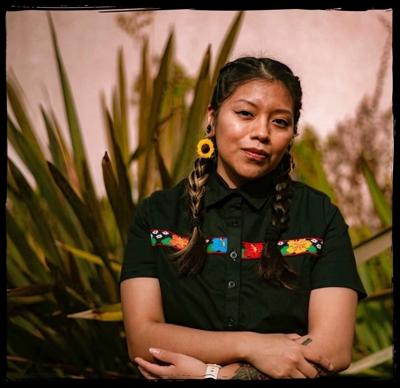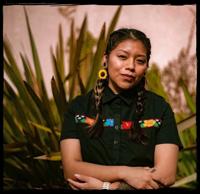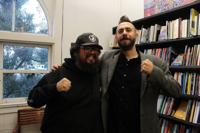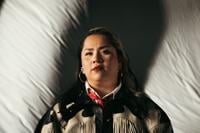MIRNA MARTINEZ, 27, Los Angeles, Therapist, She/Her/Ella, Oaxacan
As a child, Mirna Martinez would spend many of her summers in her family’s hometown, San Sebastián Abasolo, a small town in Oaxaca, Mexico.
Visiting Oaxaca became an annual tradition for her since she turned 6. Her father, who immigrated from Oaxaca to California, paid for Martinez to regularly travel back-and-forth to Mexico. She recalls fondly the first time she met her Mexican aunts, uncles, cousins and grandparents. Later, she would be proud to be a part of her family’s first generation of Oaxaquenos born in the United States.
Summers became a time of the year when she could reconnect to her family’s Oaxacan roots. “At first I did not like it,” she said. “I wanted to stay in LA with my friends, but the summer [before I started] high school, I realized how appreciative I was of those trips. Many people I knew did not grow up with their grandparents and I had that.”
Visiting Oaxaca allowed her to connect most strongly with her grandmother. Mornings with her grandma typically began at 5 a.m. and breakfast always included cheese, the same cheese her grandmother sold to locals to eke out a living.
Today, Martinez likes to refer to herself as a queer Oaxacan, first-generation American, bilingual therapist. At 27, she is also proudly among the approximately 6 percent of Latinos who serve as therapists in the U.S. Martinez credits her Oaxacan culture and the values instilled in her as a driving force for her current career and future goals.
“Our culture has always been visible in our home in the U.S. and in our home in Mexico,” Martinez said. “I always knew that being Oaxacan meant more than simply identifying as a Mexican. To this day, if you ask my mom if she’s Mexican she’ll say, ‘No.’ [She’ll] say that she’s OaxaqueÅa, and throughout the years I slowly started to embrace that I’m also Oaxaqueña, and now a therapist, too.”
Martinez was born in Venice, CA, and grew up there until her family could no longer afford the high rent rates. Eventually, they moved to Mid City. She earned a bachelor’s degree in sociology from Mount Saint Mary’s University, a private, Catholic university in LA, where 58 percent of the student population are women. Martinez said that she was unsure of what to do after graduation and took a gap year. During that time, she worked for City Year, a non-profit education organization that works with public schools in LA.
Later, Martinez moved to Ohio for two years, where she received her master degree in social work at Case Western Reverse University. There, she specialized in working with children, youth and families. “I did not know anyone,” she said, “and at first it was hard to find my Latinx community.” Around this time, Martinez began pursuing her passion to help immigrant and LGBTQIA communities. After graduating from Case Western, she worked with the refugee and immigration population in Cleveland, Ohio, offering individual and group therapy.
When the pandemic struck Southern California, where Martinez’s parents live, she decided to move back to LA. “Both of my parents have diabetes and I knew I had to go back home,” she said, “to make sure they were OK and be there for them in case they caught the virus. ”
The move also opened a new door for her professional career. As an Associate Clinical Social Worker, Martinez began offering therapy under the supervision of Adriana Alejandre, a licensed marriage and family therapist (LMFT) and founder of EMDR and Trauma Therapy Center, where Martinez continues to work. EMDR and Trauma Therapy Center is a private practice in Burbank that specializes in bilingual, trauma-informed, cultural and LGBTQ+ affirming therapies. Martinez provides therapy services to help her patients deal with trauma, depression, anxiety and major life changes. Many of her patients identify as first-generation Americans and QTBIPOC.
Today, Martinez is also the director for the Latinx Alumni Association, where she hosts a mental health support group for Latinx students at Case Western Reserve University, and a co-founder of Jefas con Libros, a community-based book club that focuses on literature books written by Black, Indigenous and other peoples of color.
CALÓ NEWS recently spent time with Martinez to learn more about her life in the medical and mental health industry.
Responses have been edited for brevity and clarity.
WHAT LED YOU TO BECOME A THERAPIST AND YOUR INTEREST IN TRAUMA THERAPY?
A lot of why I landed in this field was the connections I had at that moment. Half of my friends had a master’s degree in social work. Luckily, I was able to talk to them and pick their brains about practicing therapy. At that time, I didn’t know I could be a therapist with a social worker degree. Once I knew that was possible, I began asking, reading, and researching ways one can do that. I realized that as a social worker, you can go into many different things and work in various industries. Learning about therapy is what sparked my interest.
WHAT DOES DECOLONIZING THERAPY MEAN TO YOU?
What I mean by this is to challenge the misconceptions that exist when you think of how a therapist should act or look and the ways people think therapy should be. I lost an uncle a couple of days ago and one of my clients began talking about grief. I had to share with them that I had just lost a family member and that this was going to be a heavy topic for both of us. It’s important for me to be open to my clients about things like this. I was able to see how that session and that conversation were healing for both of us. In addition to that, I think all of my clients know me in some way, shape or form. That for me is trying to decolonize the idea that we have of therapists. For example, I recently posted a TikTok on the misconception that therapists can’t have tattoos or piercings. In reality, I think that’s one reason why many clients go to me and why they trust me. I know it takes a lot to build a connection with a therapist who might not show their personality at all. It makes me feel honored when people trust me because I show who I am.
WERE YOUR PARENTS SUPPORTIVE OF YOUR DECISION TO PURSUE A CAREER IN THERAPY?
I have always been the one that challenges my parent’s beliefs. Going into the mental health field was something I knew was going to be challenging because many Latinx families do not believe in mental health, in how important it is. Throughout the years my mom has been able to understand what depression is and how it’s not just laziness as many of our parents think. So, being able to change their mindset in ways like that has been powerful for me. I want them to think of mental health as health, as crucial and as important as physical health. But yes, they have been supportive through it all. I still live with my parents and about half a year ago I told them I was going to move out, as I was working from home and wanted an office. They cleaned the garage space and made it into an office for me. I’m saving money so I can buy a home. Their support has been a blessing.
WHAT DOES IT MEAN TO WORK IN A BILINGUAL-SPEAKING ALL-FEMALE, LATINX-FOCUSED BILINGUAL PRIVATE PRACTICE?
It’s very empowering. When I was in Ohio, I felt like one of the things that I missed was having a close Latinx community. Every single therapist in the practice is amazing. Each one of them is unique in their personality and in their practice.
HOW DO YOU SELF-CARE?
It’s the little things that I do that help me. After I’m done with my work schedule, I go ahead and take a 30-minute power nap. Or, I simply just lie on the floor to rest. I also like to work out, so I go to the gym in the morning for 30 minutes to an hour. Small things in between the day help me out, whether that is drinking water, taking small breaks or stretching [my body]. Movement is important for me, so doing that throughout the day, even in small ways, has been very helpful. I also see my own therapist. I’m able to talk to her and she’s been very helpful. She also identifies as Latinx, which is great.
WHAT IS MOST CHALLENGING ABOUT BEING A THERAPIST?
I don’t know if it’s a blessing or a curse, but telehealth (providing health services via online) has been a challenge. On one hand, it’s so convenient because you can offer your services by using technology and video. On the other hand, I do feel like there’s a deeper connection there with the clients I see in person. Sometimes it’s more challenging [via telehealth] because I don’t know what my client might be doing outside of the camera frame. Maybe they’re fidgeting but I don’t know that because we are doing our session via . Another challenge is practicing therapy with everything else that’s going on in the U.S, politically and socially. I know that I check in with my clients whenever a big thing has happened. It sometimes consumes the whole session even though they did not come to process that specific event. We create a safe space to talk about it and it’s helpful, especially if it’s something that’s weighing on them. I’ve heard from other colleagues that not all therapists want to talk about what is going on in the world and that doesn’t sit right with me.
WHAT IS MOST REWARDING ABOUT BEING A THERAPIST?
The rewarding space comes when we start noticing those small things that your clients are doing and the small wins they accomplish. For example, when they share that they haven’t had a panic attack or that they were able to implement a boundary. Hearing things like that is so rewarding. Seeing the healing that happens in a client’s life is truly special.
WHAT DOES IT MEAN FOR YOU TO REPRESENT OAXACA WITHIN THE MENTAL HEALTH AND THERAPY COMMUNITY?
When I first came into the practice, my boss told me I would need to make a professional Instagram page and I began wondering how I wanted to identify. One of the identities that I hold dearest to my heart is being from Oaxaca. Identifying as an Oaxacan therapist has been very powerful. I have seen clients who are also from Oaxaca and I see the ways they do not have to over-explain themselves in therapy. Whether they are talking about the food or the culture, we do not have to spend extra time figuring out what certain things are because we are both familiar with them. Creating that space with folks has been something special and I get excited when I’m able to help other OaxaqueÅos in their mental health journey.
WHAT IS YOUR FAVORITE THING TO DO WHEN VISITING OAXACA?
Being with my family and being in El Pueblo. I [feel a] calmness that I do not think I can get anywhere else. It’s a calmness that I can’t even get to if I go to a national park. It’s a very special feeling. The places to go to, the food I get to eat, the traditions and fiestas one might run into, those are also my favorite.
WHAT IS YOUR FAVORITE OAXACAN FOOD?
That’s a tough question. I would have to say Molé Oaxaqueño because you can eat it with chicken in a tamal. You can have it in so many different ways.
WHAT IS A PROFESSIONAL GOAL YOU HOPE TO ACCOMPLISH SHORTLY?
I take it one day at a time. But the biggest milestone for me would be to be officially licensed. I think that will open up more opportunities for my career. Another professional goal is to be a professor. I want to teach in a college. I’m not sure what specific subject, but I want to engage in the trauma-therapy work I have done in my profession.











(0) comments
Welcome to the discussion.
Log In
Keep it Clean. Please avoid obscene, vulgar, lewd, racist or sexually-oriented language.
PLEASE TURN OFF YOUR CAPS LOCK.
Don't Threaten. Threats of harming another person will not be tolerated.
Be Truthful. Don't knowingly lie about anyone or anything.
Be Nice. No racism, sexism or any sort of -ism that is degrading to another person.
Be Proactive. Use the 'Report' link on each comment to let us know of abusive posts.
Share with Us. We'd love to hear eyewitness accounts, the history behind an article.